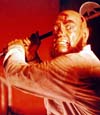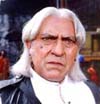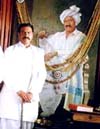
Amrish Puri khush hua
V S Srinivasan

|
Amrish Puri in Sazaa-e-Kalapani. Click for bigger pic!
|
"Mogambo khush hua." It is a condescending line, a faintly ridiculous one. But Amrish Puri really made the statement ooze menace when he said it over and over again (he still does; that's how he greeted his Filmfare and Screen awards this year) in Mr India. And audiences across India picked up the quote in delight.
Amrish Puri's biggest strength -- and weakness -- is his arresting voice. It is that which makes him look so formidable on screen; it is also what renders him a little incongruous in roles that call for a weaker, more ordinary man.
But as the larger than life Mogambo, Amrish Puri really made his reputation. The character lacked the crusty, elemental violence that Amjad Khan's Gabbar Singh had typified; The character of Mogambo looked foolish without losing any of his menace. For, if the villain isn't dangerous, what worth the hero's exertions?
Even people in Bollywood started referring to Amrish Puri as Mogambo. Though he can perhaps never hope for such a juicy role again, he's quite happy with being the highest paid villain in the business, earning a reported Rs 10 million to kick the hero around for most of every film he works in. But when he gets the director he wants, the price is negotiable. Not bad, for a man who entered Bollywood at an age that other actors are being put out to pasture.
It isn't easy getting to meet Purisaab, essentially because, despite that huge price tag, he still has so much work that he's unavailable most of the time. You finally run the man to ground in a make-up room at Film City. He has finished his shoot and is preparing to leave town for another stint of work. So he urges to get on with it.
He has already changed into a blue denim shirt, a mismatched light brown pair of jeans and a weird black hat. He notices your surprise.
"You are wondering why I am dressed like this? I love to dress weirdly sometimes," he says in that gravelly, controlled voice, and then laughs, the voice resonating in the small room.
You take the tape recorder out and place it before him. He shakes his head.
"See, I don't like having my voice taped. Can you please write it down, in case you have a pen and pad?" he asks politely enough. It is that Voice again that he is protecting from overexposure. That is why he refuses interviews on radio or on television.
Undoubtedly, that voice is something. Other than the late Sohrab Modi, Amrish Puri is the only Hindi film actor who can truly command attention with his voice.
"I had a good voice even when I was young. When I entered theatre, I started concentrating on improving it. I used to practice for a couple of hours everyday and it went up to four hours at the peak of my career," he says, before letting out a little secret, "I still practice for some time every day."
He started off in small negative roles in Hindi films. Now he is in a different league. He even walked out of a N N Sippy film when he did not get the Rs 8 million he demanded.

|
In Koyla. Click for bigger pic!
|
"I have to get what I is my due. I do not compromise on my acting, do I? So why should I accept less. People come to watch me act. The producer is getting money from his distributors because I am there in the film. Then am I wrong in charging my producers. As for the Sippy film, I was signed long back, with a promise that work on the movie would start in a year. It is three years now, and my market rate has risen. If he cannot pay me that much, I cannot do his film, right?"
Inarguable logic for a variety of reasons. So we gently steer the conversation to the recent accolades and awards he received for his role in Virasat.
"It was a role rejected by Dilip Kumarsaab and Rajesh Khanna. But I had acted with Priyan (Priyadarshan) before. I'd done positive roles in both his earlier films (Gardish and Muskurahat). I loved the role. He is a pleasure to work with."
But why is the villain doing so many positive roles today?
"Ask my directors. We are not choosers. We have to accept things given to us. It is like the menu card says. Take it or leave it." We have yet to see that one.
"The film-makers decided that after Phool Aur Kaante, Gardish, Elaan that I could be a good positive character actor too. And I am always open to good roles. I also played a positive role in Raj Santoshi's Ghatak."
But didn't it take a long time before he began getting positive roles? He stops, laughs and shakes his head.
"I did a government job for 21 years before I resigned as an 'A' grade officer. In films, they tend to slot you in a particular category. And then they just don't give you a chance to go on to the next good category." But 21 years is a very long time. Why so much caution?
"I always preferred to go about things the right way. First, you should learn the art before jumping into films as an actor. There is a learning period for everyone, be it a doctor or an engineer. And you can't learn at the producer's cost. If you are a raw actor, the producer will suffer. Will your management make you the editor today if you want to?" There he has you.
Talk about theatre and the man jumps up, scratches his cheek ruminatively, takes off his hat and caresses his bald pate before replying. A prelude to a flashback.
"Ebrahim Alkazi got me into theatre in 1961. A year later, I joined as an assistant to Satyadev Dubey -- he is my guru. When people spotted me as an actor and approached me for films, I had to quit my job and accept those offers..."

|
In Ghatak. Click for bigger pic!
|
"I do theatre even now. People generally use theatre as a stepping stone and never turn back once they are into films... Yet, theatre is something I will always do; it gives me great satisfaction. The response is instant. You are either appreciated or rejected. Besides, it gives you a chance to play all the roles that you would like to. I turn to theatre for creative satisfaction."
And the man slowly begins unspooling his career in theatre, pride and nostalgia fighting for dominance on his features.
"I played five roles -- that of the husband, the lover, the wife's boss and two other characters in Aadhe Adhure. The wife searches for a complete man and that leads her to debauchery. Ultimately she feels all men are Aadhe Adhure."
"The director of Reshma aur Shera saw me performing in the play and asked me to play a Muslim character in a film whose other characters were Hindus. I agreed... I was the reconciling character in the film, the Muslim who makes people come together."
Does he find time for theatre now? The man sighs and says, "One can find time for anything if you want to. If I can find time to exercise every day, well, I can do anything. I have been in films for 25 years, and I still do theatre. I agree that I can't spare as much time as I would love to. See, producers sometimes want bulk dates, or a show abroad comes up. Theatre requires commitment. It needs your presence. So, at times, you can't do a play you'd love to do. After all, we have to earn our bread and butter too.
"It (theatre) is a replenishing, rejuvenating, recharging workshop for me," he says. "I have done 60 full length plays, and some of them have had 400, 500 shows. In Aadhe Adhure I played five characters. Then there was Sakharam Binder, Yayati... All those roles are indelible."
So if Amrish Puri's bread and butter hadn't come to their aid, would he have withdrawn into films and deprived millions the pleasure of hearing his voice and seeing his histrionic skills?
"I want to remain in circulation. If I get into theatre full time, it isn't always possible to come back after taking a break from films, even for few years. We have to be in circulation to exist. But at the back of my mind, I have a strong desire to return to theatre. But that wish has remained that, a mere wish. And there have been umpteen unfulfilled wishes.
"I do want to play King Lear and Hamlet. And the father in All My Sons, the protagonist in A View from the Bridge, or Van Gogh in Lust for Life. You also tend to draw inspiration for your roles in films from these characters -- and from real life. But you can't pinpoint these characters. They are in my subconscious mind. I'd also love to do historical roles. But that isn't practical. I can do Macbeth or Lear only in the theatre. There are so many roles like that I'd like to do..."
And it is the theatre artiste in him that makes him provide himself at a discount for a good role.
"The script is very important. It should be good, the role should be an important one. If the role has a primary bearing on the script, Amrish Puri will take it." He laughs again, admitting that there are practical considerations too. He tries to organise his thoughts as he puts forth his point of view:

|
In Virasat. Click for bigger pic!
|
"Every role is written in a different manner. If the script is really good, the roles are good... We don't seek particular roles. No doubt, commercialisation is creeping into everything. Even in the presentation of the character. Whatever becomes interesting becomes a role. But these days, a villain in relegated to doing comedy."
"Tragedy happens in a comedian's life too. He doesn't laugh all the time. A villain can't remain vile and hated all the while. You can even laugh at them. Comedy is a part of his life, his character, his behaviour. It is not necessary that only a villain creates problems and only a comedian provides relief. Like in Muskurahat, the retired magistrate has to put up with this girls who walks into his house and refuses to get out. She knows he is her father, but he doesn't. But he can't get rid of her either. He is nonplussed, and that is the comedy...
"Anyway, the actors only represent the script. Everything goes back to a good script. How good it is depends on each actor. Shakespeare's Hamlet can be performed in 50,000 different ways. It is the character who lends a special touch to the role."
Another role he has found very different is the one he did in 1973, in Girish Karnad's Kannada film, Kaadu. "It is about a village chief who has an illegitimate relationship with a woman of another village. He goes there every night and returns home in the morning. It is a kind of humiliation for the people of the other village. So they come to his village and rape his wife. He then takes his people and massacres the other villagers... And, for the first time, the police come to the village. The story is seen through the eyes of a little child, the chief's nephew.
"There are other films that have also left an indelible mark on me. Shyam Benegal's Nishant, Manthan, Bhumika and Sooraj Ka Saatvan Ghoda." The last one won him two international awards, one in Singapore and the other in Sydney. There too he was the lecherous villain, he says, grinning hugely.
"But quite interesting, nevertheless. It is surprising how people don't see such films, ones that are really good. I also liked Govind Nihalani's Aakrosh, Ardh Satya and Party." All these films being firmly labelled "art" movies did not bother the box office any. So don't commercial films excite him?
"Of course, don't be silly," he booms. "Qurbani was very interesting. So was the pivotal role in Bapu's Hum Paanch. Waaris, Mr India, Phool Aur Kaante, Gandhi, Muskurahat, and, of course, Indiana Jones and the Temple of Doom. Where, again, he played the villain.
So where does the highly successful villain or rather, actor, go from here? Direction?
"I know I can be a competent director but I am not getting into that right now. Meri jab yeh dukan achi chal rahi hai tho why should I turn elsewhere?
|